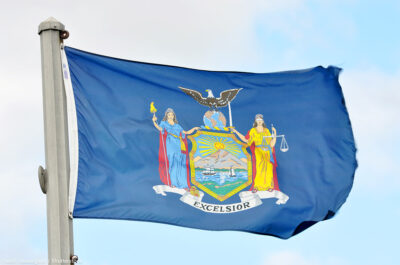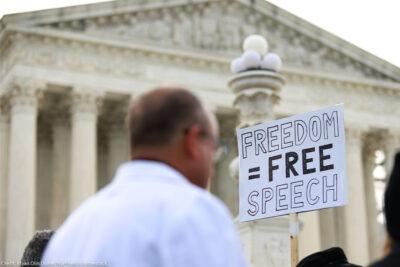
National Rifle Association v. Vullo
What's at Stake
On January 9th, 2024, the American Civil Liberties Union filed its opening brief on behalf of the National Rifle Association (NRA) in National Rifle Association v. Vullo, a key First Amendment case before the Supreme Court this term. The brief argues that a New York state regulator’s attempts to blacklist a nonprofit advocacy group and deny it access to financial services because of its controversial viewpoint violated the First Amendment. This is a critically important First Amendment fight: if government officials can pressure the businesses they regulate to blacklist the NRA in New York, then officials in other states can punish other advocacy organizations in the same way–including the ACLU itself.
Summary
In 2018, the NRA sued Maria Vullo, who was then the superintendent of the New York Department of Financial Services (DFS), after she leveraged her regulatory power over banks and insurance companies to coerce them into denying basic financial services to the NRA and, in Vullo’s own words, “other gun promotion” groups. Openly claiming that she sought to penalize the NRA because she disapproved of its political advocacy, the NRA’s complaint alleges that Vullo made good on those threats by issuing formal guidance to every bank and insurance company in New York urging them to “sever ties” with the NRA, promising lenience to certain insurers if they would stop doing business with the NRA, and imposing consent orders that required the group’s three principal “affinity insurance” providers never to provide such insurance to the NRA again.
A district court ruled that the NRA’s allegations that Vullo used threats and inducements to coerce the entities she regulates to cut ties with the NRA were sufficient to claim that she had violated the NRA’s First Amendment right to free expression. But the U.S. Court of Appeals for the Second Circuit reversed the lower court’s decision, essentially finding that Vullo had merely engaged in business as usual, not a campaign of unconstitutional censorship. It also held that Vullo’s actions were justified because the NRA’s views were broadly unpopular in New York–suggesting regulators could punish controversial or disfavored speech precisely because it is unpopular. That reasoning strikes at the very heart of the First Amendment.
The Supreme Court will now determine whether the First Amendment allows government regulators, like Vullo, to threaten retaliation against businesses that work with a controversial advocacy organization.
In its opening brief, the ACLU has urged the Supreme Court to apply the precedent it set in 1963 in Bantam Books v. Sullivan, which established that informal, indirect efforts by government officials to suppress or penalize speech by putting pressure on third-party intermediaries violate the First Amendment just as much as direct censorship, and to reject the Second Circuit’s implication that regulators can rely on the unpopularity of speech as a basis for suppressing it. By rejecting the Second Circuit’s dangerous reasoning in this case, and strengthening the protections created in Bantam Books more than 60 years ago, the Supreme Court now has an opportunity to protect the market of ideas by safeguarding all advocacy groups from government overreach.
Legal Documents
-
01/09/2024
NRA v Vullo Petitioner Brief -
01/09/2024
NRA v Vullo Brief Appendix
Date Filed: 01/09/2024
Court: Supreme Court
Download DocumentDate Filed: 01/09/2024
Court: Supreme Court
Download DocumentPress Releases
Supreme Court Unanimously Rules in Favor of NRA in Free Speech Case, Upholds First Amendment Rights of All Advocacy Groups
ACLU Defends NRA’s First Amendment Rights, Urges Supreme Court to Protect All Advocacy Groups’ Free Speech Rights
ACLU to Defend NRA Before Supreme Court, to Uphold Advocacy Groups’ Right to Free Speech


